In 2021, I became a Digital Nomad. This means I can take my work and do it from anywhere in the world. After working remotely for 3 years, I’ve learned a lot about nomadic living. I’ve based myself in places like Thailand, Vietnam, Nicaragua, Brazil and Greece.
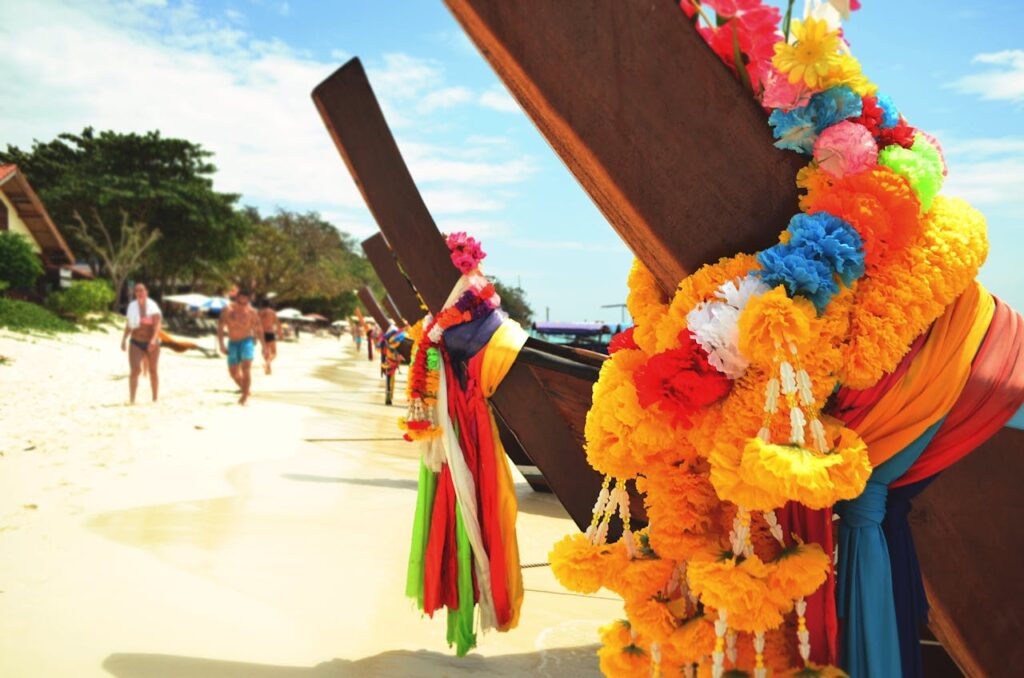
Here are some tips for how to become a digital nomad and make long-term travel your life, iif you’d like to give it a try.
Living as a Digital Nomad, you get to experience incredible places and cultures, determine your own work-life balance, and make your income while sipping on a coconut on a tropical beach or in a cool co-work space with more inspiring nomads like yourself.
Lately, I’ve been getting more and more questions about how to become a Digital Nomad. So I thought I should put together a free guide with my best tips and advice for anyone who is looking to earn location independence.
So, first things first…
Here are some tips for how to become a digital nomad and make long-term travel your life, iif you’d like to give it a try.
Living as a Digital Nomad, you get to experience incredible places and cultures, determine your own work-life balance, and make your income while sipping on a coconut on a tropical beach or in a cool co-work space with more inspiring nomads like yourself.
Lately, I’ve been getting more and more questions about how to become a Digital Nomad. So I thought I should put together a free guide with my best tips and advice for anyone who is looking to earn location independence.
So, first things first…
What is a Digital Nomad?
Simply put, a Digital Nomad is Any person who can work online and is location independent.
Usually, these are remote workers, freelancers, or business owners who travel to different locations on a regular basis.
There are many types of digital nomads, some travel around by campervan or RV, some stay in backpackers hostels or rent Airbnb apartments while traveling around, and some slow travel for a few months in different countries.
The general idea is: freedom of movement while working online.
One important thing to realize when considering becoming a Digital Nomad is that contrary to the glamorous image, it is not a continuous trip or a long vacation.
First, you must take care of your livelihood, Take it from someone who’s been there, living for a few months off my savings – it isn’t fun.
Unless you have a huge emergency fund or a stable passive income – prioritize your cash flow, job, or business.
Understand the cost of living of the location or lifestyle you’re aiming for as a Digital Nomad – and make a plan to reach it, before taking the leap.
Pros and Cons of Being a Digital Nomad
The benefits
There are loads of upsides to the location independence lifestyle that digital nomads enjoy. How great is it to be able to check off all your ultimate bucket list items while working remotely from anywhere in the world? If you ask any digital nomad why they do it, you’ll probably hear one of the following:
- Save money living in a lower cost-of-living area
- The flexibility to live where you want
- Ditch the toxic environment of office politics
- Experience new cultures & ways of living
- Learn new skills or languages
- Network with like minded people
- Set your own schedule and take time off when you want to
My favorite thing about blogging is that you have tons of way to generate an income from it. From displaying ads on your site, market affiliate products, paid sponsorships and guest posts, and selling your own course or product.
For example, a lot of bloggers I’ve met make their money by selling E-books around their core topic or offering coaching programs and online courses. All of the above can of course turn into a great way to generate passive income, like with online courses, as you need to create those only ones and can sell repeatedly without additional effort.
The downsides
Working from anywhere is a dream for many people. But like all life choices, there are both pros and cons to a nomadic lifestyle. Here are some of the downsides:
- Moving often may be exhausting
- Losing productivity to FOMO
- Potentially lonely lifestyle
- Stability is harder to find
- A general lack of private space
- Travel loses its magic and appeal
After being a Digital Nomad for 3.5 years, some of the downsides finally caught up with me,
As a sort of introvert, it took me a while to realize the importance of networking and socializing while solo traveling long term.
Luckily, there are plenty of programs and retreats around the world, all year round, but more on that later.
Having said that, as a digital nomad with years of experience, I am happy to share my experiences with those just getting started!
STEP 1: How Digital Nomads Make Money
So you realized you’re ready to make the leap to nomadic life, that’s amazing!
But before you can fully become location independent, it’s crucial that you figure out how to make money online in the way that works best for you.
Although the pandemic has long been forgotten, its effects still take place in the economy and the business world keeps downsizing and reducing physical costs like office space.
I’ve elaborated on the various ways you can make money online in a previous post, but here are some frequent examples I’ve come across during my travels for jobs people do remotely:
- Blogging
- Customer service
- Consulting
- Marketing
- Freelance writers
- Software developers
- Virtual assistant
- Quality assurance
Most Digital Nomads I came across over the years simply started out by either taking their job remotely as a trial for a few months or switching to a remote friendly job in the same position they used to do before going fully nomad. These options are great as they keep you at peace while making a big change, not to mention you get to keep a steady income while doing so.
Figuring out how you’re going to earn money as a digital nomad is one of the biggest hurdles to location independence.
This isn’t a one-size fit – everyone has their own skill set, experience, and goals. You’ll need to figure it out on your own.
Whether you’re going to quit or switch jobs, go freelancing, or just trust the universe and play it by ear, I strongly recommend you have AT LEAST 3 months worth of savings in an emergency fund.
A good tip is to check the target destination cost of living beforehand, on a website like NUMBEO.COM, and add about $1-2K to it for flights and/or emergencies.
STEP 2: The logistics
So you’ve found a way of making an income without being strapped to an office!
However, there’s some more stuff to consider before making the leap, for example: finding proper insurance, finding a place to stay, getting the right Visa, how to pay (or avoid paying) taxes, and more.
Taxes for Digital Nomads
Depending on the country you’re coming from, the rules of paying taxes may vary a lot.
A great rule of thumb if you’re serious about becoming a full digital nomad, is to hire a good consultant who specializes in working with people who live overseas.
While staying abroad for a while in some countries, like the US, will allow you to get an exclusion to avoid paying US taxes on up to $100,000 worth of income, some other countries will require you to pay taxes after staying within their borders for a certain amount of time annually.
Banking for Digital Nomads
Managing your money while traveling can have its own set of challenges. For example, cards getting canceled when they’re used from foreign countries, and how to get paid while living overseas.
I highly recommend picking up a Wise Account (their fees are cheaper than PayPal, but you should have a PayPal account too).
If you’re not from the US or UK, Payoneer is also a good option.
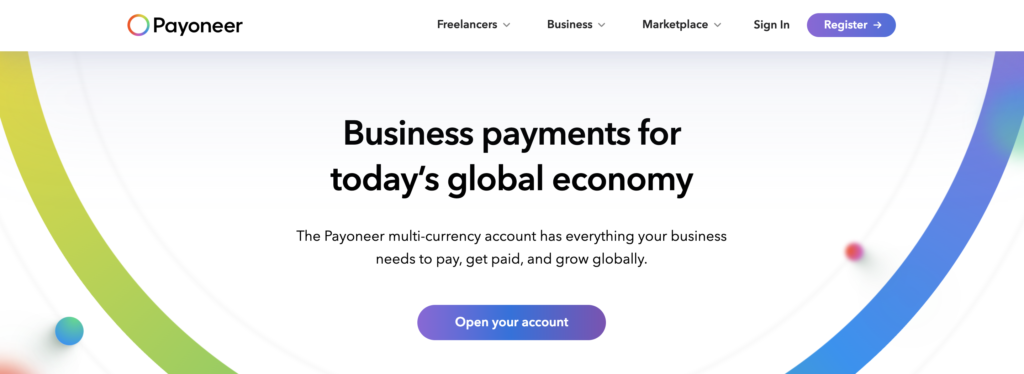
Having a good travel credit card is also very helpful, like the Chase Sapphire Preferred. It has no foreign transaction fees, includes car rental insurance, boasts a low annual fee, and will ultimately help you score free flights the more you use it through collecting points & miles.
Staying connected
Digital nomads can only work freely when they have a fast & reliable internet connection, so a decent WiFi is crucial while traveling.
Luckily, websites like NomadList help you research destinations by many factors, such as safety, overall costs for nomads, and even Wifi speed!You can also look at this great guide from Expert Vagabond on the best international cell phone plans for travelers and nomads.
Stay secure with a proper VPN
To ensure you can access the websites you want, avoid a frozen bank account, find better travel deals, and of course – get an extra level of privacy – be sure to download a good VPN (and avoid free ones).
There are several different VPN’s out there, both free and paid. For the best service, it’s better to make use of a paid one. I personally used both NordVPN and Proton VPN.
NordVPN has a seven-day free trial (plus 30-day money back guarantee), with 3,000+ VPN servers in 160 VPN server locations in 94 countries

Proton VPN, on the other hand, offers 6500+ servers in 110+ countries, plus an amazing iPhone app which I like better, so nowadays it’s my most used.
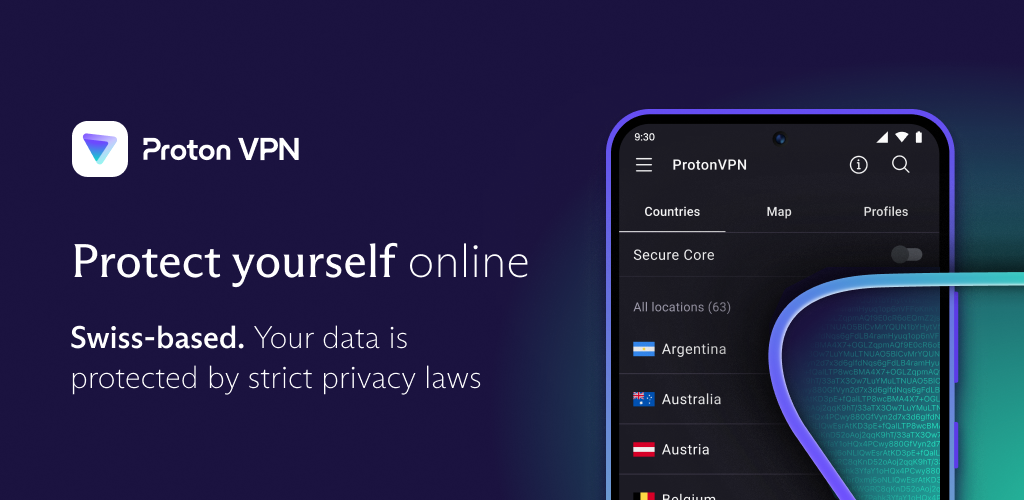
nsurance for Digital Nomads
However safe you are, accidents are bound to happen. Especially while traveling.
And without insurance, depending on the country you’re in, you could be screwed.
Nowadays, there are a few great health insurance options that are specifically designed for digital nomads.
The two most popular are SafetyWing and World Nomads
Types of Travel Insurance
There are a few different kinds of travel insurance, and some plans cover more than others. Before buying a travel insurance, ask yourself some questions:
- Are you going to travel long term, for more than 6 months?
- Are you taking some expensive photo/computer gear?
- Will your current health insurance cover you overseas? How much will it cover? Does it include medical evacuation?
- Do you have any pre-existing conditions?
- Are you the type of person who books hotels/flights/activities in advance?
- Or do you just wing it and pay for these services as you use them?
- Are you worried your trip might get canceled?
The purpose of travel medical insurance is to protect you against accidents, injuries, illness, or hospitalizations while traveling.
Medical Evacuation Insurance is coverage for emergency transportation (often via airplane) to a major hospital for better treatment.
Trip Cancellation Insurance is coverage for unexpected interruptions in your travel plans.
Baggage/Property Insurance is coverage for theft or damage to your gear while traveling.
The Best Insurance for Digital Nomads in 2024
SafetyWing
SafetyWing is a fantastic budget travel insurance option for travelers. Their plans can be purchased before or after your trip has already begun. Plans start at only $40 per month, and they include theft of personal property too!
Another big perk is that they can also cover you in your home country, or a dependent child who is traveling with you. Which is nice for digital nomads and families traveling with kids.
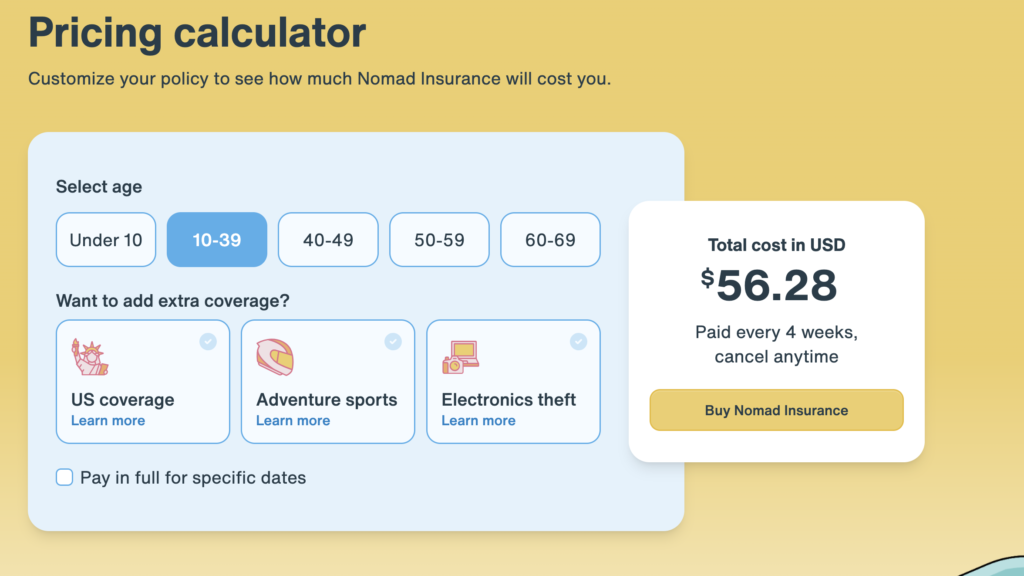
World Nomads
World Nomads is another very popular option that specializes in short-term coverage for travelers and nomads.
You purchase a plan with very little advanced notice and extend the coverage online from anywhere.
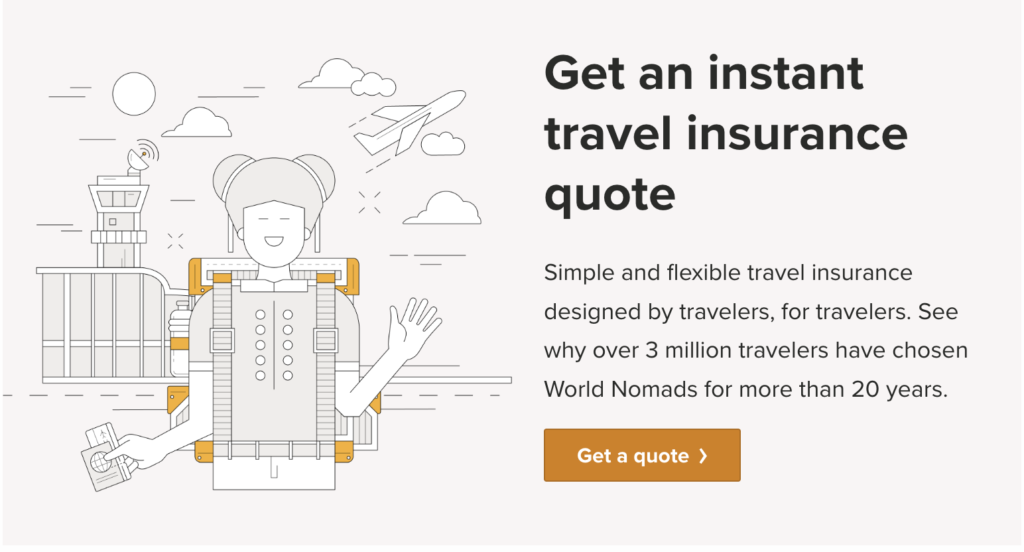
Some Travel Insurance tips:
- Don’t forget to read the fine print! Know what you’re covered for. Some policies don’t cover extreme sports or theft of unattended items, for example.
- Take a photo or a video of all your travel gear with a date stamp.
- Save PDF copies of any travel gear purchases & hospital receipts. Keep originals too.
- Store this information online in a secure, easy to access place like Google Drive, Evernote, or even Dropbox.
No one likes to think about theft or injury when they’re on vacation, but the truth is accidents sometimes happen, and without proper travel insurance, an unexpected incident could ruin the rest of your trip. Never travel without it!
Finding a place to stay
Before you start looking for accommodation, you first need to figure out your traveling style and duration.
Most Digital Nomads I came across, including myself, tend to stick to the concept of Slow Travel. Meaning they usually pick a destination and live there for anywhere from one to six months.
This kind of travel lets you really get the feel of a place, almost like a local.
One nice hack I discovered while traveling like this, is that when booking a place for 4 weeks, the rate drops dramatically!
Let’s take a random example, this condo in Krabi’s usual rate is around $30/night.
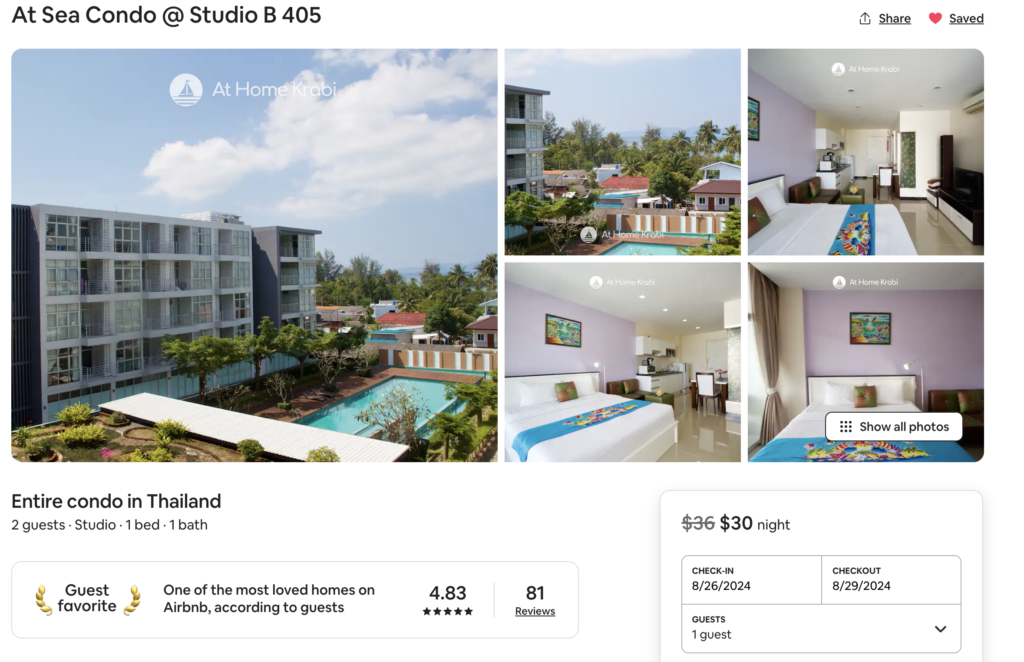
Now, changing the stay duration to 28 days – look at that monthly discount!
That’s about 35% off just like that, which is crazy. The new rate is now only $19/night.
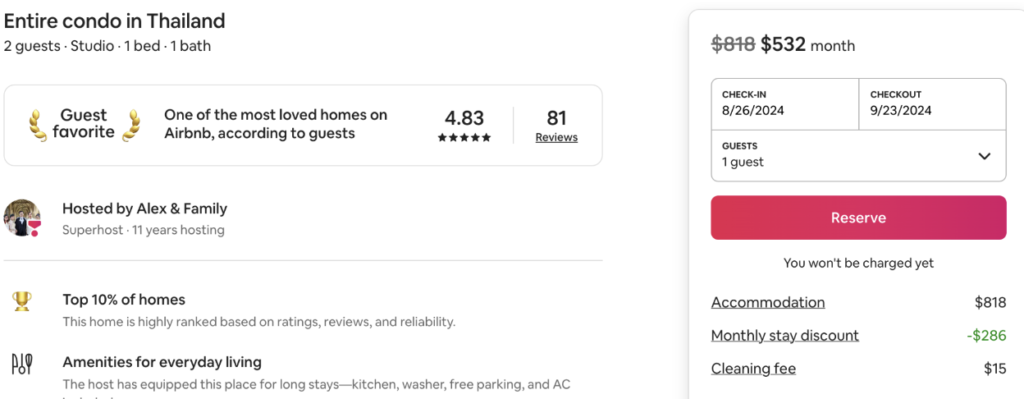
Co-living
If you’re to live even more affordably, you might consider checking out coliving.com, which offers a revolutionary living arrangement, tailored to the lifestyle of remote workers and freelancers.
This housing model combines private living with shared communal spaces, creating a supportive environment that encourages networking and cultural exchange among like-minded professionals worldwide. With this housing model, digital nomads can thrive professionally and personally while exploring the world and addressing the challenges of isolation and connectivity remote workers face.
They offer spaces in tons of locations worldwide, no booking fees, and the flexibility to book monthly stays easily, and definitely worth checking out if that way of life excites you.
Making friends
Being a Digital Nomad can definitely get lonely sometimes. But luckily, nowadays there are lots of ways to mitigate that feeling.
Sure, staying in backpacker hostels is a fun way to meet other travelers, but it might get tough to get work done or live calmly in the more party-like atmosphere these places usually offer.
You can also keep a cafe or co-working space going routine for yourself, where you’ll naturally put yourself in a position to meet and mingle with like-minded people.
If you’re just starting out, I highly recommend joining some Facebook groups before you go.
While every country now offer its own local DN groups, you can also check out very popular global ones like Global Digital Nomad Network and Digital Nomads Around The World.
Moreover, you should definitely check out some targeted Digital Nomad Programs.
Here are some popular ones for you to consider:
- The Nomad Escape
- Remote Year
- Hackers Paradise
- Unsettled
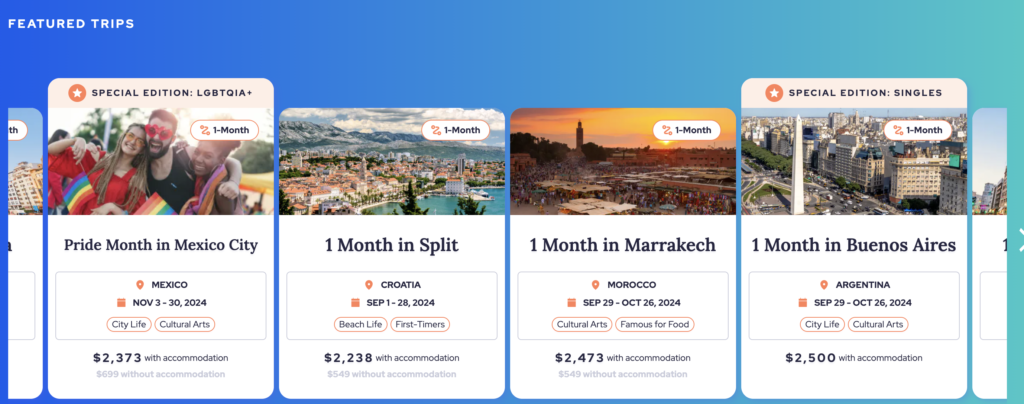
To read more about digital nomad programs, check out our dedicated
STEP 3: Where to go?
Many Digital Nomads are seeking a combination of low-cost living, decent & stable internet services, and the ability to renew tourist visas over and over again.
Some of the most popular destinations among digital nomads are Indonesia, Thailand, Colombia, Hungary, Greece, Bulgaria, and Portugal.
For me, a must-have in a slow travel destination is beautiful beaches, greenery, cheap and healthy food, and lots of wellness options. Last year, for example, I lived in Thailand for a few months, and plan on going to Vietnam and Indonesia later this year.
Take some time to think for yourself what’s important to you in a destination. What are your lifestyle needs, budget, networking options, wellness activities, and of course – climate.
You can explore destinations on websites like Nomadlist, Digital Nomad World, and also on YouTube channels like Joose the Nomad which is sharing their experience living as a digital nomad in South East Asia.

STEP 4: Taking the leap
Save enough money
Although it’s very possible to travel cheaply, nothing is free, and you’re going to have to save some money upfront before starting your adventures.
As mentioned above, I recommend having an emergency fund of AT LEAST 3 months of living in the destination you’re considering.
If your current job allows you to full-time travel and pays enough for you to live the lifestyle you want, that’s amazing!
But, being a nomad, you always have to be ready that things won’t go according to plan.
One thing I DO NOT recommend is quitting your day job until you either have a very healthy savings account that will pay for your travels, or you have already built up a side hustle that is making you money regularly.
Remember – running out of money in a foreign country is not fun!
Also, always keep some money on the side for unplanned flights to your home country.
Before becoming a digital nomad, start your own business or find a job that allows you to work remotely.
Some reality check
After +3 years of working remotely, I’ve seen everything.
Making money online while traveling is DEFINITELY possible! However, not everyone will be able to sustain a steady income for their lifestyle.
Some people simply aren’t cut out for running the business side of things, or they rush to take the leap before building themselves a sufficient safety net.
Remember, being a Digital Nomad isn’t just a long holiday, it takes planning, sacrifice, and hard work.
Having said that, it definitely looks like Remote work is only going to get easier in the future, and online business opportunities are only going to become more and more diverse.
